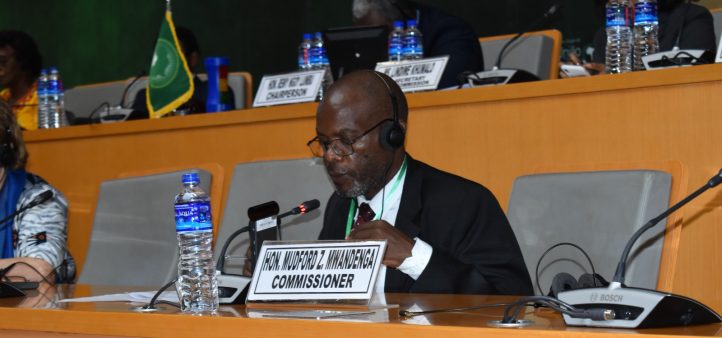The panel, moderated by Commissioner Maya Sahli-Fadel, Vice-Chairperson of the African Commission on Human and Peoples’ Rights, brought together four panellists who shared an understanding of States’ obligations with regard to the collection and use of Economic, Social and Cultural Rights (ESCR) data under the African Charter and international law. The discussion also identified concrete ways in which the Commission could work with States to improve the production of data on ESCR.
Commissioners Mudford Z. Mwandenga, Chair of the Working Group on Economic, Social and Cultural Rights in Africa, underlined that article 22 of the African Charter recognised and detailed norms applicable to States and reinforced the centralities in State realising the ESCR. “The African Commission recognises the necessity of data to realise ESCR in order to encourage States to strengthen their capacity to produce and disseminate data that will provide an accurate assessment of implementation of ESCR,” said Commissioner Mwandenga. States should strengthen their capacity to produce disaggregated data that would provide an accurate assessment of the implementation of economic, social, and cultural rights.
Furthermore, Zulekha Amin, Campaign and Membership Facilitator for Sub-Saharan Africa at the International Network for Economic, Social and Cultural Rights (ESCR-Net) highlighted that data is more than numbers and figures. “It’s what the government uses to make decisions about what affects ESCR. Unfortunately, the wrong kind of data is produced and used by States. This actually leads to more inequality and to people being left behind. ESCR-Net has identified 5 principles to lead a human rights-based approach to data. These principles are: equality and non-discrimination, high-quality data, participation, transparency and accessibility of information, and privacy,” added Zuleha Amin.
Angela Nabwowe Kasule from Initiative for Social and Economic Rights (ISER-Uganda) and member of ESCR-Net Monitoring Working Group highlighted that many African countries were adopting and using digital systems, but those were discriminating. “The Economic Social and Cultural Guidelines (ECOSOC Guidelines) refer to the principles of equality and non-discrimination as an obligation for States to provide statistics on the enjoyment of ESCR, disaggregated by age, gender and ethnicity,” Kasule highlighted. States should effectively implement the ECOSOC Guidelines to enable the Commission to evaluate ESCR rights.
Samuel Olando from Pamoja Trust (Kenya), a member of ESCR-Net Monitoring Working Group, raised the fact that data produced shouldn’t be seen as a confrontational space but as evidence generated to provide a platform for conversation, dialogue and solutions to the challenges that communities and vulnerable populations experience. According to him, “data gives identity, data gives citizenships, data gives voice, data gives space and data enhances dialogue between the various players that are contributing to the development of our nations”.
Data is therefore necessary for the realisation of human rights. Without data, we cannot understand the prevailing human rights situation, we cannot make informed policy decisions, and we cannot assess the effectiveness of those policy decisions.
In conclusion, Commissioner Maya Sahli-Fadel invited States to integrate disaggregated data when presenting their reports to the Commission. “Few States come with data that allows us to have data on the implementation of the African Charter,” Commissioner Sahli-Fadel concluded.
Watch the session here.
Download as PDF




